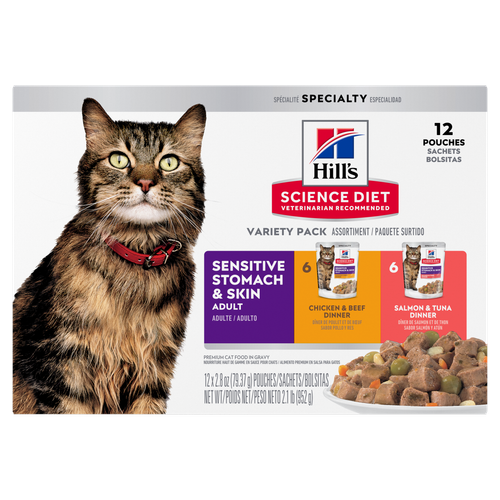
-
Find the right food for your petTake this quiz to see which food may be the best for your furry friend.Find the right food for your petTake this quiz to see which food may be the best for your furry friend.Health CategoryFeatured products
 Adult 6+ Large Breed Chicken Meal, Barley & Rice Recipe Dog Food
Adult 6+ Large Breed Chicken Meal, Barley & Rice Recipe Dog FoodSupports energy level, joint health, and beautiful coat in large breed mature dogs
Shop Now Puppy Sensitive Stomach & Skin Salmon & Vegetable Stew
Puppy Sensitive Stomach & Skin Salmon & Vegetable StewGentle on stomachs while nourishing skin & supporting development in growing puppies
Shop Now Adult Perfect Weight & Joint Support Chicken & Brown Rice Recipe Dog Food
Adult Perfect Weight & Joint Support Chicken & Brown Rice Recipe Dog FoodThis weight management and mobility support dog food was created with Hill’s unique understanding of the biology of overweight dogs.
Shop NowFeatured products Sensitive Stomach & Skin Chicken & Beef Dinner
Sensitive Stomach & Skin Chicken & Beef DinnerGourmet daily nutrition, carefully made. Tasty chunks with chicken & beef in a decadent gravy. Supports digestive health, nourishes skin and promotes a lustrous fur.
Shop Now Adult Perfect Weight Salmon & Vegetable
Adult Perfect Weight Salmon & VegetableOver 70% of cats lost weight within 10 weeks when fed this nutrition
Shop Now Adult Sensitive Stomach & Skin Pouch Variety Pack Cat Food, Chicken & Beef, Salmon & Tuna
Adult Sensitive Stomach & Skin Pouch Variety Pack Cat Food, Chicken & Beef, Salmon & TunaCarefully made, gourmet daily nutrition. Tasty chunks with Salmon & Tuna in a decadent gravy. Supports digestive health, nourishes skin and promotes a lustrous fur.
Shop Now -
DogCat
- Cat Tips & Articles
-
Health Category
- Weight
- Skin & Food Sensitivities
- Urinary
- Digestive
- Kidney
- Dental
- Serious Illness
-
Life Stage
- Kitten Nutrition
- Adult Nutrition
Featured articles The Right Diet For Your Pet
The Right Diet For Your PetLearn what to look for in healthy pet food & nutrition, including ingredients, quality of the manufacturer, your pet's age, and any special needs they have.
Read More Pet Food Storage Tips
Pet Food Storage TipsWhere you store your cat and dog food can make a big difference in the quality and freshness once it is opened. Here are some common questions and recommendations for optimal storage for all of Hill’s dry and canned cat and dog food.
Read More Water
WaterWater is the most important nutrient of all and essential for life. Animals can lose almost all their fat and half their protein and still survive, but if they lose 15% of their water, it will mean death.
Read More -


Dog food reviews appear on numerous websites, but how can you tell the difference between trustworthy reviews and those submitted by people who play favorites or have an ax to grind? These six tips will help you sift through the many customer reviews you find online so that you can read with a critical eye in search of the right product for your pup.
1. Check Website Policy
As you read various dog food ratings online, check the review policies for the site. Some websites do not monitor their ratings and allow anyone to post. Others carefully review all ratings left by users in order to screen out profanity, competing product pitches, and similar forms of spam from the more authentic customer feedback. Knowing the terms of the site publishing consumer content can help you discern genuine reviews from nonsense.
2. Read Multiple Reviews
No matter how great a product, someone, somewhere, will be disgruntled. Read a wide range of reviews to identify trends in the observations of each buyer. Whereas a dozen positive reviews and one negative review is probably harmless, complaints of a common issue across each testimonial can suggest the negativity is justified. Look for common threads rather than basing your decision on one profound remark. Remember, every dog is a little different, but if you see a common complaint, you may want to find an alternative dog food.
3. Assess the Reviewer's Credentials
Some websites screen reviews or only allow qualified professionals to comment on health matters pertaining to pet food. These domains are proud of their contributors and publish their credentials next to their name. So, when you see titles such as "DVM" (Doctor of Veterinary Medicine) or Veterinary Assistant you can presume the reviewer has the nutritional insight into what quality foods should contain.


Tasty Tips
4. Watch Out for Unfounded Health Claims
Not all dog foods are created equal. Foods such as Hill's Prescription Diet brand provide nutrition-based solutions to specific pet health challenges and are only available via a recommendation from your veterinarian. Dog food reviews that claim a certain product "cured" a dog of a problem may simply be a pet parent ascribing improper cause and effect. Weight management foods, for example, often work differently depending on the breed and activity level of the canine.
Check the product information carefully on all dog food ratings, and trust only those companies and brands that back up their claims with scientific research. The opposite can also be true regarding to claims that a certain food harms dogs. If you find claims that a certain type of dog food caused dogs to get sick or die, it's worth reaching out to the manufacturer to see if any of the claims are substantiated; or consulting your veterinarian about your concerns is always a good idea. They research food choices as much as you do, and they will be able to give you good insight into whether a certain type of dog food could be harmful to your canine friend.
5. Read the Entire Review
People tend to glance at reviews and note the stars or numbers assigned to dog food reviews. But the text of the review itself can yield insight into potential misunderstandings from the reviewer that led to a skewed result. A pet parent may not understand how organic ingredients influence pet health, allowing him or her to judge certain ingredients on a false premise. Read the entire review, noting to yourself if the reviewer's comments are valid in this way.
6. Read Carefully
Dog food critiques, whether on a blog or branded website, may be misleading if the reviewer doesn't understand the product they are reviewing. A user who lumps organic pet food in with mass-produced varieties isn't properly comparing their worth to certain aspects of dog health. Each product is quite different. Assigning virtues to one over another is a strong indication that the reviewer isn't tuned into a product's ingredients, or is simply making a value judgment based on what they perceive their dog likes.
As a truly concerned pet parent, invest in the comments that carefully assess the nutritional content of your dog's food. Dog food reviews are all well and good, but you want to know exactly what you're pouring in your dog's bowl, and your vet is your best resource to meet your dog's specific nutritional needs. Only then can you be sure you're feeding your dog a balanced food supported by true observations of health and wellness at all stages of his life. It is also always a great idea to monitor his health after selecting a dog food for him. Each dog will react to his food differently, so he is also a good source for dog food ratings and reviews.
Related products

Advanced nutrition shown to support joint health and improve mobility

Supports energy level, joint health, and beautiful coat in large breed mature dogs

This weight management and mobility support dog food was created with Hill’s unique understanding of the biology of overweight dogs.

Gentle on stomachs while nourishing skin & supporting development in growing puppies
Related articles

Though it may seem like your four-legged friend loves nothing more than to nap on the couch, dogs need regular exercise to stay healthy just like people do.

Selecting the right food for your puppy is a key to quality nutrition and a long, healthy life., Learn more about how to select the right puppy food.

Learn what you can feed your pregnant or nursing dog to keep her and her new pups healthy.

A dog with a sensitive stomach has special needs. Learn more about sensitive stomach symptoms in your dog, what you can do to help sooth your pet’s insides and get recommendations on sensitive stomach dog food.

Put your dog on a diet without them knowing
Our low calorie formula helps you control your dog's weight. It's packed with high-quality protein for building lean muscles, and made with purposeful ingredients for a flavorful, nutritious meal. Clinically proven antioxidants, Vitamin C+E, help promote a healthy immune system.
Put your dog on a diet without them knowing
Our low calorie formula helps you control your dog's weight. It's packed with high-quality protein for building lean muscles, and made with purposeful ingredients for a flavorful, nutritious meal. Clinically proven antioxidants, Vitamin C+E, help promote a healthy immune system.


